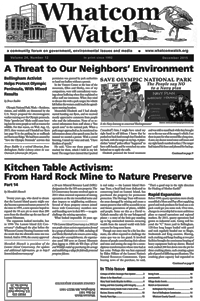To celebrate the 24th year of publishing Whatcom Watch, we will be printing excerpts from 20 years ago. David M. Laws has been generous enough to volunteer to review the Whatcom Watch for 20 years ago to find suitable material to reprint. The below excerpts are from the October 1995 issue of Whatcom Watch.
by Barrett Schmanska
Originally criticized as a stooge of big land developers, the property rights movement has gained considerable populist support from ordinary citizens who feel victimized by environmental laws …. Members of the property rights movement strongly feel that economic opportunities and the middle class standard of living are being choked by environmental regulations. The broad appeal of the movement indicates that many in Washington agree.
[…]
Live Like Ike
To read property rights literature, one cannot help but get sentimental for 1950’s America. It was the Eisenhower era. A time of social harmony and unprecedented economic expansion …. No doubt much has changed in over 40 years …. But for many Americans, the kind of life promised in 1950 remains a powerful vision. Opinion polls show that many baby boomers, despite having experimented with its destruction in the Sixties, have or expect a life like their parents. Even today’s so-called Generation X, the younger post … baby boom generation, have an idealized view of the Fifties. […]
An Economy Transformed
Between 1950 and 1965, the United States experienced the most spectacular economic growth ever recorded in the modern industrial world. The growth gave birth to the American middle class, and helped shape the expectations of the next three generations of Americans. Along with the growth, American society was transformed. Millions of people moved from small towns across America to industrial centers to take advantage of high paying manufacturing jobs …. It would take about 20 years for Japan and Germany to regain their economic strength. Once recovered, Japan and Germany would end America’s monopoly on manufactured products, and the Eisenhower Era would come to an end.
Rise and Fall of the Working Man
The single most dramatic change in the American economy over the past 45 years has been the loss of traditional blue collar industrial jobs. Never before has a class of people risen so quickly, then fallen so hard …. This would be the first generation of American workers who, though more productive than their parents, would live less well than their parents.
Live Like Rosanne
The impact of the economic changes has fallen hardest on so-called blue collar workers living in American’ rural areas and the suburbs …. The standard Property Rights notion that environmentalists and environmental regulations are responsible for middle America’s economic decline is not supported by the facts. Environmental laws have little or nothing to do with the loss of manufacturing jobs …. The anti-environmental, anti-urban, anti-intellectual rhetoric espoused by the Property Rights movement has struck a resounding chord with a number of suburban and rural constituents who are looking to blame someone or some group for the destruction of their economic well-being ….
A Daunting Challange
Despite considerable evidence that environmental protection is good for Washington’ overall economy, there are large numbers of rural and suburban landowners … who have been unable to find a place in the new global, information based economy. It is this group that is being asked to sacrifice potentially huge development profits in order to promote environmental protections …. Unlike twenty years ago, land development has become a way to maintain a foothold on a middle class standard of living.
[…]
Like all economic revolutions before this one, there will be no turning back and there are limited options …. Building a consensus in an age of economic transformation is a daunting task, but it can be done. We can begin by agreeing that the 1950’s America is long gone.




























